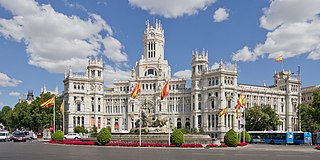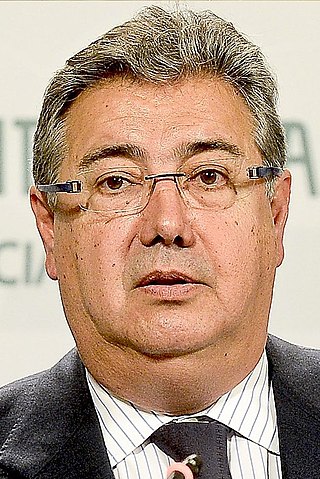Related Research Articles

A province in Spain is a territorial division defined as a collection of municipalities. The current provinces of Spain correspond by and large to the provinces created under the purview of the 1833 territorial re-organization of Spain, with a similar predecessor from 1822 and an earlier precedent in the 1810 Napoleonic division of Spain into 84 prefectures. There are many other groupings of municipalities that comprise the local government of Spain.

The Mayor of Madrid presides over the Madrid City Council, the government body of the capital city of Spain. The mayor has the duty of boosting the local policies, it directs the action of the other executive bodies, leads the Local Executive Administration and is accountable to the Plenary for its political management.

The 1987 Madrid City Council election, also the 1987 Madrid municipal election, was held on Wednesday, 10 June 1987, to elect the 3rd City Council of the municipality of Madrid. All 55 seats in the City Council were up for election. The election was held simultaneously with regional elections in thirteen autonomous communities and local elections all throughout Spain, as well as the 1987 European Parliament election.

The 2007 Madrid City Council election, also the 2007 Madrid municipal election, was held on Sunday, 27 May 2007, to elect the 8th City Council of the municipality of Madrid. All 57 seats in the City Council were up for election. The election was held simultaneously with regional elections in thirteen autonomous communities and local elections all throughout Spain.

The 2011 Madrid City Council election, also the 2011 Madrid municipal election, was held on Sunday, 22 May 2011, to elect the 9th City Council of the municipality of Madrid. All 57 seats in the City Council were up for election. The election was held simultaneously with regional elections in thirteen autonomous communities and local elections all throughout Spain.

The 1987 Barcelona City Council election, also the 1987 Barcelona municipal election, was held on Wednesday, 10 June 1987, to elect the 3rd City Council of the municipality of Barcelona. All 43 seats in the City Council were up for election. The election was held simultaneously with regional elections in thirteen autonomous communities and local elections all throughout Spain, as well as the 1987 European Parliament election.

The 1999 Barcelona City Council election, also known as the 1999 Barcelona municipal election, was held on Sunday, 13 June 1999, to elect the 6th City Council of the municipality of Barcelona. All 41 seats in the City Council were up for election. The election was held simultaneously with regional elections in thirteen autonomous communities and local elections all throughout Spain, as well as the 1999 European Parliament election.

The 2019 Madrid City Council election, also the 2019 Madrid municipal election, was held on Sunday, 26 May 2019, to elect the 11th City Council of the municipality of Madrid. All 57 seats in the City Council were up for election. The election was held simultaneously with regional elections in twelve autonomous communities and local elections all throughout Spain, as well as the 2019 European Parliament election.
A provincial council is the administrator and governing body of a province of Spain. It is one of the entities that make up local government in Spain. The council is made up of a president, vice presidents, an executive committee and the plenary assembly of deputies.

The City Council of Madrid is the top-tier administrative and governing body of the Madrid, the capital and biggest city of Spain.

Local government in Spain refers to the government and administration of what the Constitution calls "local entities", which are primarily municipalities, but also groups of municipalities including provinces, metropolitan areas, comarcas and mancomunidades and sub-municipal groups known as Minor local entities.

The 2007 Seville City Council election, also the 2007 Seville municipal election, was held on Sunday, 27 May 2007, to elect the 8th City Council of the municipality of Seville. All 33 seats in the City Council were up for election. The election was held simultaneously with regional elections in thirteen autonomous communities and local elections all throughout Spain.

The City Council of Barcelona is the top-tier administrative and governing body of the municipality of Barcelona, Catalonia, Spain. In terms of political structure, it consists of the invested Mayor of Barcelona, currently Jaume Collboni, the Government Commission, and an elected 41-member deliberative Plenary with scrutiny powers.

The City Council of Seville is the top-tier administrative and governing body (ayuntamiento) of the municipality of Seville, Spain. In terms of political structure, it consists of the invested Mayor of Seville, currently Juan Espadas, the Local Executive Board, the deputy mayors, and an elected 31-member deliberative Plenary (Pleno) with scrutiny powers. Each district in the municipality has its corresponding executive board.
References
- ↑ Local Government Act 1985, Article 20.
- ↑ Local Government Act 1985, Article 19.
- ↑ Local Government Act 1985, Article 35.
- 1 2 Cools & Verbeek 2013.
- 1 2 Zafra Víctor 2004, p. 107.
- ↑ Canel 1994, p. 49.
- ↑ Márquez Cruz 1999, p. 312.
- ↑ Zafra Víctor 2004, p. 108.
- ↑ Márquez Cruz 2010, p. 39.
- ↑ Rodríguez Álvarez 2010, pp. 85–86.
- ↑ Márquez Cruz 2010, p. 44.
- ↑ Electoral Systems 1999.